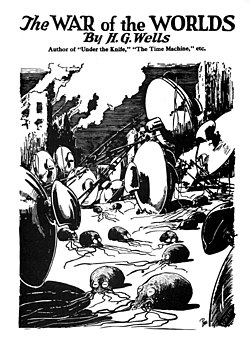Science Fiction Literature

This is an introduction to the genre of science fiction, its history, its place in literature, and its current practice. We will define the genre, mention many of the subgenres, and provide an overview of the history of science fiction.
We will focus especially on the authors whose work staked out the territory, those who have become masters in the field, and we will work to cover authors who are currently writing in the genre and expanding its frontiers today.
Throughout, please bear in mind that many works are written in more than one subgenre at a time, so the lines can be blurry. For example, an author writing for young adults can also be writing in the Lost Worlds genre too.
There is a large quantity of good science fiction being written by authors in languages other than English. With the exception of Jules Verne, most English speakers would be challenged to name even one of these other authors.
Since this is intended as textbook, we will include discussion questions, and suggest exercises to help the student and teacher, master the material. We will also include suggestions for further reading.
Table of Contents
[edit | edit source]
- Introduction and Historical Overview
- The History of Science Fiction
- The Early Stories
- Penny Dreadfuls, Dime Novels, and the rise of the Pulps
- The Death of the Pulps
- The Triumph of Science Fiction


- Subgenres of Science Fiction (Titles are examples only)
- Adventure
- Lost Worlds (Cadwal Chronicles, Dragonriders of Pern, Pax / Astra)
- Military SF (Berserkers, Ender Wiggins, Hammers Slammers, Honor Harrington, Northworld)
- Soldiers of Fortune (John Grimes, Matador)
- New Frontiers (Cluster, the Ship series)
- Planetary Exploration and Colonization (Engines of God, Gaea, the Grand Tour, the Mars Trilogy)
- Space Opera (Dune, Foundation, Lensmen series, Star Trek, Star Wars, Vorkosigan Saga)
- New Space Opera (The Culture series, Xeelee, Viriconium, Revalation Space, Night's Dawn trilogy)
- Alien Beings
- First Contact
- Alien Societies (Cheela, Mission Earth, Helliconia)
- Interspecies Relations (Exiles saga, Sector General)
- Alien Invasion and Occupation (Colonization series, Dahak)
- Anthropology / Sociology (Neanderthal Parallax Trilogy)
- Alternate History (Guns of the South, Worldwar/Colonization series)
- Bleak Futures and Dystopias
- Ecological Disasters (Earth Abides, Battle Circle, Jenny Casey trilogy, Jerry Cornelius, Obernewtyn Chronicles)
- Nuclear / Post-Apocolypse (A Canticle for Leibowitz, Xenogenesis, Endworld)
- Hard Science (Spiderworld)
- Technology (Chobits, Legacy of the Aldenata, Instrumentality)
- Science Fantasy (John Carter of Mars, Jules Verne’s stories)
- Humor (Stainless Steel Rat, Hitchhiker's Guide to the Galaxy)
- Love and Romance (Tower and the Hive)
- Mystery and Detectives (Elijah Bailey, Greg Mandel, In Death, Ukiah Oregon)
- Social Criticism (Transmetropolitan)
- Sex and Gender Roles (Uglies, The Left Hand of Darkness)
- Political (The Man in the High Castle)
- Religion (Left Behind, Hyperion)
- Species Evolution (Amber series, Beggars trilogy, Wildcards)
- World Versions (Eon)
- Young Adult / Children's (Witch World, Ember)
- Adventure
- National and World Literatures
- Soviet / Russian
- French
- Scandinavian
- Japanese
- German
- East European
- Spanish speaking
- China
- Other World SF literature
- Venues for Publication of Science Fiction Literature and Future Trends
- Professional Magazines and Publishers
- Fanzines and Amateur Publications
- Recognition and Awards
